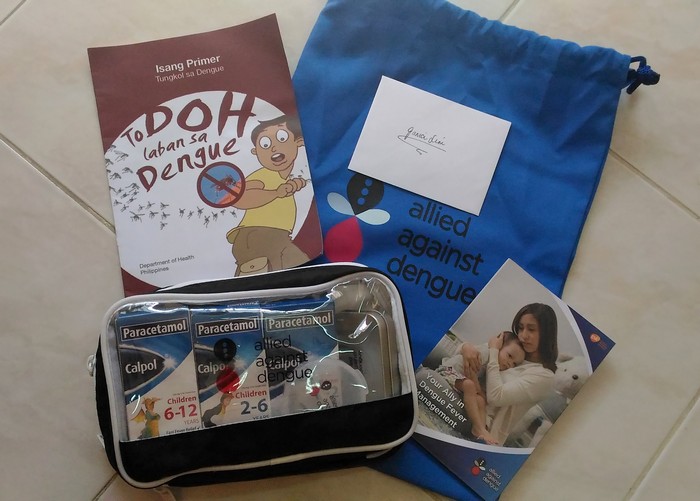Over the past few years, I’ve heard of several people I know who have fallen prey to dengue. Fortunately, no one really close to us have experienced it but it’s still something I’m very scared about. That’s why when I got an invitation to attend the Allied Against Dengue event, I really wanted to go but sadly, I wasn’t able to.
It was such a disappointed not to go but thankfully, the people behind the event were generous enough to send me this kit with important information about dengue and the Allied Against Dengue Movement. I learned through this kit that there’s so much about dengue that I don’t know and I figured that some of you might be on the same boat. So, let me share with you some dengue facts.

Did you know that….?
From January to December 2015, there was a total of 200,415 cases of Dengue Fever in the Philippines, a +60% increase in reported cases vs. 2014. Hotspots are as follows based on the most number of cases:
- Central Luzon
- Calabarzon
- National Capital Region
- Ilocos Region
- Cagayan Valley
- Cordillera Autonomous
- ARMM
Dengue should be suspected if your child has at least two of the following symptoms:
- Vomiting (inclusive of nausea)
- Muscle and joint pain
- Diarrhea
- Skin Rash
- Headache (inclusive of pain behind the eye)
- Bleeding nose and gums
Home care of children with less severe dengue includes managing their symptoms by doing the following:
- Give them enough bed rest
- Use a lukewarm sponge if the patient still has fever
- Give them plenty of fluids
- Give paracetamaol for fever
The World Health Organization (WHO) states that paracetamol is the only medicine recommended for the treatment of fever related to medicine. Take note, some medicines such as aspirin and ibuprofen may aggravate gastritis or bleeding in dengue fever. Mefenamic acid, steroids, antibiotics and other NSAIDs should also be avoided. So, beware! Always consult your doctor first.
In case your child has severe dengue infection, he or she will require urgent medical care and might need to be hospitalized because it is life-threatening. Symptoms of severe dengue usually appear 3 – 7 days after the first symptoms of dengue appears. Warning signs for severe dengue include:
- Severe abdominal pain
- Bleeding nose and gums
- Persistent vomiting (+/-) blood
- Difficulty breathing
- Drowsiness, confusion, seizures
- Pallor, cold/clammy hands or feet
Because the disease is rapidly growing across the country, a group of like-minded people banded together in order to empower healthcare providers, private and public organizations and communities and reduce the impact of dengue in the country. Designed as an open movement, the Allied Against Dengue Movement was born. It was launched just last July 12, 2016 to galvanize all forces and efforts to unite, take action and defeat dengue. Every alliance partner will leverage their core competencies and dedicate energy, funds and resources in the movement to help bring down the incidence rate of deaths caused by dengue.
The members include:
- The Department of Health (DOH)
- Philippine Pharmacists Association, Inc. (PPHA)
- GlaxoSmithKline Consumer Healthcare Philippines, Inc. (GSK)
- Mercury Drug Corporation (MDC)
- SmartParenting.com.ph
- CNN Philippines
The coalition strategy include:
- Distribution of 50,000 DOH primers to at least 5 public schools in dengue hotspots in Metro Manila
- Distribution of 15,000 leaflets to 1,000 pediatricians and general practitioners
- Education of proper dengue fever prevention and management to 20 health centers for Baranggay outreach programs
- Implementation of Continuous Pharmacy Education (CPE) Program in identified chatpers, targeting 200 pharmacists
- Education and recruitment of at least 1000 Allies Against Dengue through employee engagement, oline and on ground activities
You’d be happy to know too that Calpol (paracetamol) by GSK, a brand we love here at home, is a proud ally against dengue. It is actually suitable for managing dengue fever. It is clinically proven to relieve 6 types of pain and fever: headache, sore throat, fever & pain after vaccination, toothache, muscle ache and musculoskeletal pain. Kids can even take it with or without food. It’s definitely safe to use to manage dengue fever because it is after all, paracetamol.
If you want to learn more about Allied Against Dengue and how to be an ally, contact 1800-14441-0884 / 1800-8908-8275 or email [email protected]. Join the fight against this deadly fever-causing disease and be a proud Ally against Dengue now so that we can do more, feel better and live longer!

Early detection is the key to a quick treatment of these diseases. I believe it is important to know the symptoms and be able to tell exactly what our kids are experiencing. This helps in giving them the proper care as soon as possible. The movement itself is a great idea to bring more awareness to dengue. I’m sure there are lots to learn here. Your post is certainly helpful in providing all of the facts related to dengue. Thank you for this and here’s to hoping the number of cases start decreasing soon!